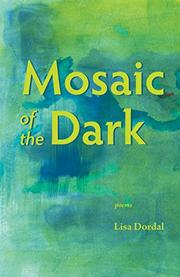Review by Alicia Marie Brandewie
Lisa Dordal’s debut collection of poetry, Mosaic of the Dark (Black Lawrence Press, 2018), is built of rich language bound together by the grit of everyday existence. The book is equally celebratory of the luminously erudite as the utilitarian and coarse—both are dynamic and necessary in the speaker’s confrontation and evolution of her sexuality, faith, and relationship to her family. Dordal’s strength is in refusing to look away from the truth. The collection stakes this truth by opening with three portraits of authority figures, two of which criticize the inflated authority afforded to male artists and their foil in “For the Cashier at T.R. Wolfe’s Toy and Candy”. The speaker praises this hawkish adult of her childhood, “And how can I not admire her// for her refusal to feign/ contentment?”
The poems are at once familiar in sepia and soft focus—narratives of an awkward playground wedding in the poem “Sixth Grade” and a father embracing his daughter in the poem “Flash”—but they also expand our collective definition of familiar. The childhood wedding’s awkwardness comes not from age but from unexpressed queerness, and then with the father’s pose revealing more menace than playfulness.
The collection is a buildingswoman, crafted by a poet with rich perspective and knowledge in theology, philosophy, psychology, science, and oppression. Here is a speaker steeped in experience, measuring out “The Lies that Save Us”. A lesbian couple in Georgia, “we lie like Abraham. / Are you sisters? people ask. / Yes, we answer. Twins, even” because there is always a small threat; it is always “tick season and all” for those who love outside the strict definition of heteronormative love, but this couple is safe in “the power of things unseen:/ atoms, quarks, and auras, / and all the love that lies between. / Kissing energy, we call it.” For those readers without Bible verses and Christian ritual etched into their psyches, the references are no more intimidating or threatening than two taps in a Google search, and for those with such etchings, these poems illuminate those familiar verses and rituals with a new wavelength.
Mosaic of the Dark’s perspective is multi-dimensional—challenging prescriptive sexuality, naming the influence of class, unafraid to call out racism, interrogating incarceration, understanding education’s inequities, and unabashed in examining mental health crises. The violations these poems catalogue range from micro—beauty standards, assumptions of marital status, children’s pettiness—to the macro—gang rape, murder, suicide—and the full range in between abusive parents, abusive religions, abusive cultures.
However, as the astounding poem “Amanant”, and indeed the entire collection demonstrates, powerful, visceral, and affective art does not require (porno)graphic or gratuitous violence or flagrant confession. Even without delving into the event that inspired the poem, the horror of the lines “the human intestine/ is approximately five feet long.// Only five percent of hers/ would remain” is magnified by the preceding “If dark matter could draw,/ it would not draw itself.” Dordal then reveals the catastrophically obvious lies we perpetuate by ending with “And the woman, it was said, died peacefully.” Without using exposure or letting any blood, Dordal raises bile. She uses a very precise but journalistic epigraph as a compass to point the reader to the context, should they desire to read the details of the gang rape. The same graphic-free but gravitational tide of emotion comes in smaller waves too. It is there in the father’s dismissal of her suicide attempt at the end of the “The Living Room”— “Aspirin? He’d say./ Aspirin can’t kill you”. It can also be seen in the mother’s critique of a minor aspect of the speaker’s wedding—her first, to a man, the ultimate attempt at performing straightness, which her most-likely queer mother never gave up enacting —”was a summons from the past/ to get things right.”
Thankfully, Dordal’s injection of lyricism gives the book a respite from the voyeuristic confessional that has become expected of those who have survived and depict trauma. Midwesterners will recognize a super/uncanny power to speak of the thing without naming it; in Dordal’s poems this characteristic disengagement is harnessed instead to illustrate never-before articulated feelings. There is a redemption in such harnessing—turning the surrounding silence which confounded, frustrated, and repressed in childhood into a tender, empathetic, world-enhancing skill in adulthood.
Mosaic of the Dark is a survival guide and toolkit. Instead of a Swiss army knife there is respect for the ways people survive despite their dysfunction(s). Dordal humanizes rather than admonishes those who hurt her. Instead of matches and water filters there is a spirituality of interconnectedness. There is a blanket against the slow hypothermia of silence. There is anti-poison to combat the ever-triggered flight or fight of depression and anxiety. Because what happens at the end of Holy Week—the title of the second section and a guide to the book’s arc, the speaker’s survival—is resurrection,redemption, redefinition. This comes to pass even when a prayer is not carried by a satellite phone and extra batteries, but by granting swatted house flies their own angels: “Who’s to say this wasn’t the gesture / of some lively god pressing a small coin / into my heart.”
